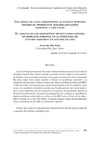Please use this identifier to cite or link to this item:
https://accedacris.ulpgc.es/jspui/handle/10553/14015
| DC Field | Value | Language |
|---|---|---|
| dc.contributor.author | Paz-Albo Prieto, Jesús | en_US |
| dc.date.accessioned | 2015-07-23T02:31:01Z | - |
| dc.date.accessioned | 2018-03-15T14:35:40Z | - |
| dc.date.available | 2015-07-23T02:31:01Z | - |
| dc.date.available | 2018-03-15T14:35:40Z | - |
| dc.date.issued | 2014 | en_US |
| dc.identifier.issn | 0213-0610 | en_US |
| dc.identifier.uri | https://accedacris.ulpgc.es/handle/10553/14015 | - |
| dc.description.abstract | Las metodologías interactivas han estado tradicionalmente ausentes de las aulas de educación superior. Este artículo presenta un estudio de caso basado en una experiencia llevada a cabo en la práctica docente en los grados de educación de la Universidad Rey Juan Carlos. Este estudio exploró la eficacia del aprendizaje interactivo y la implicación del alumnado al utilizar Socrative como Sistema de Respuesta Personal (SRP), o clicker. Se realizó una encuesta para conocer las percepciones de 70 estudiantes sobre su uso. Los resultados obtenidos muestran que Socrative permite una mayor implicación y más compromiso de los estudiantes en el proceso de aprendizaje, además de favorecer la colaboración y fomentar la participación. Sin embargo, se descubrieron algunos problemas relacionados con el uso de los SRP como el abuso de los dispositivos móviles en el aula. Por último, el estudio propone varias recomendaciones sobre la utilización de los SRP en la educación superior. | en_US |
| dc.description.abstract | Higher education classrooms have long suffered from a lack of interactivity. At Universidad Rey Juan Carlos, some instructors actively seek technologic interventions that can increase interactivity in large classes. This study explored the learning effectiveness and engagement appeal of using Socrative as a Student Response System (SRS), known as clicker, and also reports results from a formal implementation of the system in K-12 prospective teachers higher education classrooms. A questionnairebased survey was conducted to inquire into students’ perceptions on their use, and data collected from 70 students was examined. As the data reveal, Socrative can much better engage students in the learning process, promoting collaboration and encouraging participation. However, some problems related to the use of SRSs were revealed such as the off-task use of the smartphones in the classroom. Recommendations were provided with respect to the use of SRSs in higher education. | en_US |
| dc.format | application/pdf | es |
| dc.language | spa | en_US |
| dc.relation.ispartof | El Guiniguada | en_US |
| dc.source | El Guiniguada. Las Palmas de Gran Canaria: Servicio de Publicaciones, Universidad de Las Palmas de Gran Canaria, 1984- ISSN 0213-0610, n.23, 20142, p. 125 | en_US |
| dc.subject | 58 Pedagogía | en_US |
| dc.subject | 531204 Educación | en_US |
| dc.subject.other | Innovación docente | en_US |
| dc.subject.other | Educación superior | en_US |
| dc.subject.other | Aprendizaje activo | en_US |
| dc.subject.other | Instructional innovation | en_US |
| dc.subject.other | High education | en_US |
| dc.subject.other | Active learning | en_US |
| dc.title | El impacto de los dispositivos móviles como Sistemas de Respuesta Personal en la enseñanza de futuros maestros: un estudio de caso | en_US |
| dc.type | info:eu-repo/semantics/article | en_US |
| dc.type | Article | en_US |
| dc.compliance.driver | 1 | es |
| dc.identifier.absysnet | 235347 | - |
| dc.identifier.crisid | - | - |
| dc.investigacion | Artes y Humanidades | en_US |
| dc.rights.accessrights | info:eu-repo/semantics/openAccess | es |
| dc.type2 | Artículo | en_US |
| dc.identifier.external | - | - |
| dc.identifier.ulpgc | Sí | es |
| dc.description.sellofecyt | Sello FECYT | |
| dc.description.esci | ESCI | |
| dc.description.dialnetimpact | 0,0 | |
| dc.description.dialnetq | Q4 | |
| dc.description.erihplus | ERIH PLUS | |
| item.grantfulltext | open | - |
| item.fulltext | Con texto completo | - |
| Appears in Collections: | Guiniguada. 3ª Etapa.n.23, 2014 Artículos | |
Page view(s) 1
73
checked on Jan 11, 2026
Download(s)
68
checked on Jan 11, 2026
Google ScholarTM
Check
Share
Export metadata
Items in accedaCRIS are protected by copyright, with all rights reserved, unless otherwise indicated.
